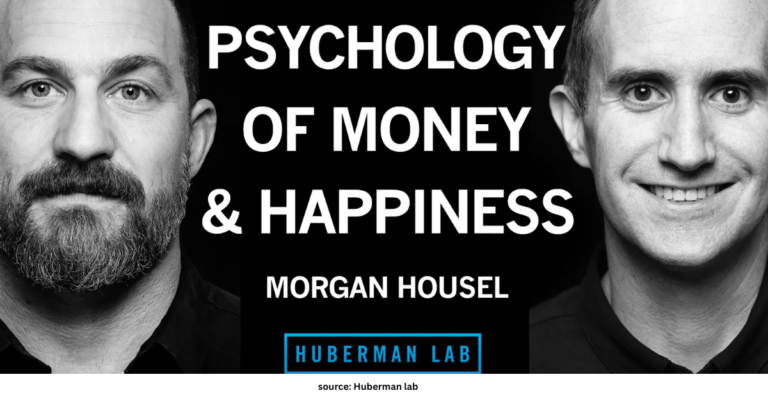"The Psychology of Money: How Financial Freedom Shapes True Happiness" Key take aways from the Huberman Podcast.

Host: Huberman is an American neuroscientist and host of the Huberman lab podcast.
Guest: Morgan Housel is a New York Times Bestselling author of The Psychology of Money and Same As Ever. His books have sold over eight million copies and have been translated into more than 60 languages.
Introduction
Top Key Takeaways

• Financial behavior is deeply subjective and often makes sense when understood within an individual’s unique context. As Housel states, “all Behavior makes sense with enough information”. Our upbringing, experiences, and generation all shape how we view and interact with money. This means there isn’t one universally “right” way to manage finances.
• The pursuit of wealth is often driven by a desire for freedom, independence, and stress reduction, rather than just accumulating more money. Housel emphasizes that “freedom is really about independence” and being “free of stress”. However, constantly chasing wealth can paradoxically undermine this very freedom.
• Future regret should be a key consideration in financial decisions. Drawing on Kahneman’s insights, Housel suggests asking, “will I regret spending this or not spending this will I regret making or not making this investment?”. However, anticipating future regret is challenging and evolves over time.
• Credit can create a “false sense of hope” and facilitate a “continuous spiral” of acquiring more things without addressing underlying issues. Instead of a “band-aid of credit,” Housel suggests addressing root causes of dissatisfaction like health and relationships.
• Money contributes to happiness indirectly by facilitating experiences, connections, and a sense of purpose. While a fancy house might bring happiness, it’s often because it enables hosting loved ones. True fulfilment often comes from “independence plus purpose”. Lottery winners often don’t find lasting happiness because they lack the purpose associated with earned wealth.
• The desire to climb the social ladder through wealth is a “game that cannot be won” due to constant upward comparison. Ironically, “some of the most money insecure people you’ll ever meet are the richest people you’ll ever meet”. When money becomes deeply tied to identity, it can become a “psychological liability”.
• Behavioural factors are more critical than intelligence in achieving long-term financial success. Showing people the math of compounding is different from motivating consistent saving. Creating environments that minimize temptation and automate positive actions is often more effective.
• Prioritizing “eulogy virtues” (character and relationships) over “resume virtues” (financial achievements) can provide a clearer perspective on what truly matters in life. Most people aspire to be remembered for their character, yet spend more time chasing career and financial success.
• The ultimate goal of money should be to provide freedom and independence – the autonomy to live and work on one’s own terms. Savings should be viewed as “money that you are actually spending on Independence” rather than idle funds. Leaving a career on one’s own terms is crucial for long-term satisfaction.
• Social comparison, amplified by social media, creates a constant feeling of inadequacy despite increasing wealth at a macro level. The definition of “adequate” money is a “growing level over time”. Happiness might be found in environments with less intense social comparison.
• Children learn about money by observing their parents’ behavior, making leading by example the most effective teaching method. Withholding resources to teach grit can backfire and breed resentment.
Top Quotes

• All behaviour makes sense with enough information.” – Financial decisions, even those that seem irrational, have deep personal roots.
• Your financial choices are shaped by how you were raised, where you grew up, and the generation you belong to—things outside your control.” – Morgan Housel on the subjectivity of money management.
• There is no single ‘right’ way to save, spend or manage money.” – Personal finance is just that—personal.
• A well-calibrated sense of your future regret should guide financial decisions.” – Anticipating future feelings can lead to smarter money choices.
• Will I regret spending this or not spending this? Will I regret making or not making this investment?” – A practical framework for decision-making.
• If I were on my deathbed tomorrow, would I regret the vacations I didn’t take or the cars I didn’t buy?” – Regret changes over time, making financial planning complex.
• The desire to climb the social ladder through wealth is a game that cannot be won.” – The endless comparison trap.
• Some of the most money-insecure people you’ll ever meet are also the richest.” – Wealth doesn’t always bring security.
• When money becomes part of your identity, it stops being an asset and starts being a liability.” – Financial freedom means money serves you, not the other way around.
• True freedom is not doing nothing—it’s having the autonomy to choose what to do on your own terms.” – The real value of wealth.
• Money’s greatest power is in providing independence—to work, live, and retire where and when you want.
• Every dollar you don’t spend is actually money spent on independence.” – A new way to look at saving.
• The definition of ‘enough’ money keeps growing over time.” – The goalpost always moves.
• Society’s drive for more fuels progress, but for individuals, it creates a constant feeling of inadequacy.” – The hamster wheel of comparison.
• What we truly seek when we seek wealth is freedom.” – The core motivation behind financial success.
• Money can’t buy happiness, but it can buffer stress.” – Security has its own value.
• People who say money doesn’t buy happiness usually don’t have any.” – A stark perspective on financial struggles.
• A good life formula: Independence + Purpose.” – The two key ingredients for fulfilment.
• Not a single centenarian has said, ‘I wish I earned more money.’ But nearly all said, ‘I wish I spent more time with loved ones.’” – A long-term perspective on what truly matters.
• We chase ‘resume virtues’ (status, money) but truly value ‘eulogy virtues’ (kindness, relationships).” – David Brooks on misplaced priorities.
• The human brain struggles with exponential thinking.” – Why compounding remains an underestimated force.
• Your savings are a direct investment in your future independence.” – A mindset shift towards financial security.
• The ‘peak-end rule’ means we remember experiences by how they end.” – Why finishing well matters.
• You always want what you can’t have.” – The endless cycle of desire.
• The key to a meaningful life? Be a lifelong learner.
• Spending money is an art—subjective, personal, and often contradictory.” – Morgan Housel’s philosophy on spending.
• Evolution doesn’t care if you’re happy—it cares that you survive and reproduce.” – Why our desires are never fully satisfied.
• Most parents say, ‘I just want my kids to be happy.’” – True wealth isn’t just financial.
• Managing money well means understanding yourself, your family, and your evolving goals.” – The foundation of financial wisdom.
ACTIONABLE INSIGHTS

• Understand Your Subjectivity: Recognize that your financial decisions are deeply influenced by your personal history, upbringing, and life experiences. There is no single “right” way to manage money. Take time to reflect on how your past has shaped your current financial habits and beliefs.
• Identify Your Definition of Freedom and Independence: Determine what financial freedom truly means to you. Is it early retirement, the ability to change careers, or simply being free of financial stress? Focus on using money as a tool to achieve this independence rather than accumulating wealth for its own sake.
• Calibrate Your Sense of Future Regret: When making financial decisions, ask yourself: “Will I regret spending this or not spending this? Will I regret making or not making this investment?”. While anticipating future regret is challenging, try to consider the long-term implications of your choices. Remember that your sense of regret may evolve over time.
• Be Aware of the “End of History Illusion”: Recognize that you will continue to change in the future, even if it’s hard to imagine now. Avoid extreme financial plans that may not align with your future self’s values and desires. Strive for a balanced approach rather than the extremes of over-saving or reckless spending.
• Be Cautious with Credit: Understand that credit can create a false sense of hope and may mask underlying life challenges. Before relying on credit, consider whether you are addressing the root causes of your dissatisfaction (e.g., health, relationships, purpose).
• Focus on Indirect Happiness through Money: Recognize that money often contributes to happiness indirectly by facilitating experiences and relationships. Instead of chasing material possessions, consider how your spending can enhance your connections with loved ones and support your sense of purpose.
• Cultivate Independence and Purpose: Strive for a life that combines independence (autonomy over your choices) and purpose (a goal bigger than yourself). Use money as a tool to support both of these elements.
• Automate Positive Financial Habits: Create environments that minimize temptation and automate positive actions like saving and investing (e.g., automatic retirement contributions). This can help overcome the challenges of exponential thinking and immediate gratification.
• Prioritize “Eulogy Virtues” over “Resume Virtues”: Reflect on what you want your obituary to say about you (e.g., being a good friend, parent, community member) and align your actions and priorities accordingly. Avoid solely chasing “resume virtues” (e.g., income, degrees) at the expense of what truly matters to you in the long run.
• Value Freedom and Autonomy: Recognize that money’s greatest value lies in providing you with options and control over your life. View savings not as idle money but as funds actively contributing to your independence. Aim to leave endeavours on your own terms to maximize long-term satisfaction.
• Be Mindful of Social Comparison: Understand that the pursuit of more driven by social comparison is a “game that cannot be won”. Focus on your own financial goals and what brings you genuine fulfilment rather than constantly comparing yourself to others.
• Reflect on Your “Carrots and Sticks”: Periodically consider the forces driving your actions and career choices. Are you motivated by intrinsic goals or external pressures and expectations? Ensure your pursuits align with your values and evolving identity.
• Tap into Your “Verb State”: Identify the underlying activities and processes that bring you a sense of delight, friction, and release. Focus on engaging in these “verb states” as they can be more self-rewarding and drive more meaningful outcomes than solely focusing on titles or external rewards.
• Consider Your Legacy: Think about what you want to leave behind and how you want to be remembered. This perspective can help you prioritize actions and values beyond immediate financial gains.
• Continuously Learn and Adapt: Recognize that your relationship with money and your life goals will change over time. Be open to learning and adapting your financial strategies and priorities as you evolve.
THOUGHTS
Morgan has a way of making us look beyond ourselves while guiding us to search within. His insights remind us that true fulfilment comes from self-awareness. When we truly understand ourselves, we gain the clarity and confidence to make choices that not only help us grow but also positively impact those around us.
Books mentioned here
• The Psychology of Money by Morgan Housel.
• The Art of Spending Money by Morgan Housel.
Share your thoughts with us! Enjoy Learning.
